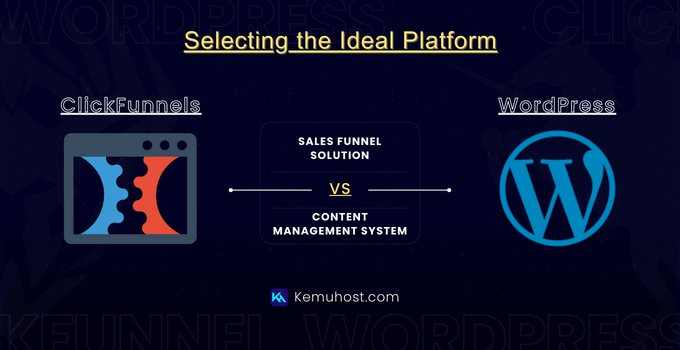ClickFunnels vs WordPress: Selecting the Ideal Platform

Welcome to a comprehensive comparison: ClickFunnels vs WordPress, two of the most popular website builders and sales funnel platforms available. Whether you’re just starting online or you’re looking to take your existing business to the next level, choosing the right platform is essential.
In this article, we’ll take a close look at the features, benefits, and drawbacks of both ClickFunnels and WordPress. We’ll also discuss which platform is best for different types of businesses and users.
Understanding Your Needs:
May I inquire about your objectives?
Before embarking on an extensive examination of these two platforms, it’s essential to understand what you want to achieve. Are you launching an e-commerce store, building a personal blog, or running a service-based business? The nature of your ambitions will greatly influence the choice of a platform that best aligns with your overarching vision.
To what extent are you proficient in technology?
Your aptitude for technological matters constitutes another pivotal consideration. Both ClickFunnels and WordPress cater to diverse levels of technical expertise. ClickFunnels, for instance, is tailored for individuals who are relatively new to the digital landscape, while WordPress, though offering more extensive customization capabilities, entails a steeper learning curve.
ClickFunnels – The Comprehensive Sales Funnel Solution

Conceptualized by Russell Brunson, ClickFunnels is a specialized platform tailored for the efficient management of sales funnels. This platform is meticulously designed to simplify the creation, launch, and optimization of sales funnels, targeting entrepreneurs seeking a swift and effective solution.
Pros of ClickFunnels
- Simplicity: ClickFunnels simplifies the creation of sales funnels, making it accessible to everyone.
- Templates: A wide range of professionally designed templates to jumpstart your sales funnel journey.
- Integrated Marketing: ClickFunnels encompasses a comprehensive suite of marketing tools, including email marketing, automation, and payment processing, all seamlessly integrated into the platform.
- Optimization: ClickFunnels equips users with built-in split-testing and tracking tools, facilitating the continuous refinement of their sales funnels.
Cons of ClickFunnels
- Limited Blogging: ClickFunnels may not be the optimal choice for those seeking a robust blogging platform, as its primary focus is on sales funnels.
- Pricing: The cost associated with ClickFunnels can become substantial, particularly as your business expands and requires more advanced features.
WordPress: Most Popular Content Management System

In contrast, WordPress stands out as a versatile content management system, most popular for website development. It’s not just for blogs; it’s a fully-fledged CMS that can handle any website, big or small.
Pros of WordPress
- Customization: Nearly endless options for themes and plugins to tailor your site to your exact specifications.
- SEO Flexibility: Renowned for its unparalleled SEO capabilities, WordPress offers access to numerous plugins designed to enhance a website’s search engine optimization.
- Blogging: With an extensive and user-friendly editor, WordPress remains a platform of choice for bloggers seeking to publish content effectively.
- Scalability: WordPress effortlessly adapts to the growth of your website, ensuring it remains accommodating as your business or blog expands.
Cons of WordPress
- Learning Curve: Mastering all the features of WordPress may necessitate a substantial time investment due to its comprehensive array of functions.
- Maintenance: Regular updates and security checks are essential. While vital for website security, it can be perceived as a burden by some users.
Cost Comparison – ClickFunnels vs WordPress

When it comes to costs, ClickFunnels and WordPress have different pricing models. ClickFunnels offers straightforward pricing tiers, while WordPress’s cost can vary significantly depending on your selection of themes and plugins.
However, in general, WordPress is the more affordable option. This is because WordPress is free to download and use, and there is a wide range of free and affordable themes and plugins available.
ClickFunnels, on the other hand, requires a monthly subscription fee(starting from $127). Additionally, you may need to purchase additional tools and services, such as email marketing software and payment processing.
| Feature | ClickFunnels | WordPress |
| Type of platform | Cloud-based software as a service (SaaS) | Self-hosted content management system (CMS) |
| Pricing | Monthly subscription plans start at $127 | Free to download and use, but requires hosting and domain name |
| Hosting | Included in subscription | User-responsible |
| Domain name | User-responsible | User-responsible |
| Themes | Limited selection of pre-built themes | Wide range of free and premium themes are available |
| Plugins | Limited selection of pre-built plugins | Wide range of free and premium plugins are available |
| Additional costs | May require additional tools and services, such as email marketing software and payment processing | May require additional tools and services, such as email marketing software and payment processing |
Design and Customization – ClickFunnels vs WordPress

The design of your website is a crucial element of your online presence. Each platform provides a distinctive set of instruments, and your decision hinges on the level of precision and personalization you seek.
- ClickFunnels: ClickFunnels is a drag-and-drop platform, which makes it easy to create and customize landing pages, sales pages, and other types of funnels. There is a limited selection of pre-built templates available, but you can also create your own custom designs.
- WordPress: WordPress is a more flexible platform, but it also requires more technical knowledge to customize. There are thousands of free and premium WordPress themes and plugins available, which gives you a lot of control over the look and feel of your website.
Which platform is better for design and customization?
If you’re looking for a platform that’s easy to use and that offers a variety of pre-built templates, then ClickFunnels is a good option. If you need more flexibility and customization options, or if you’re comfortable with coding, then WordPress is a good option.
Here is a table that summarizes the key differences – ClickFunnels vs WordPress in terms of design and customization.
| Feature | ClickFunnels | WordPress |
| Ease of customization | Easy to customize with drag-and-drop interface | More difficult to customize, requires technical knowledge |
| Pre-built templates | Limited selection of pre-built templates | Wide range of free and premium themes are available |
| Custom designs | Yes, you can create your own designs | Yes, you can create your own designs |
| Coding required | No coding required | Coding may be required for advanced customization |
E-commerce Capabilities – ClickFunnels vs WordPress

When it comes to e-commerce capabilities, Both ClickFunnels and WordPress offer e-commerce capabilities, but there are some key differences. Each option provides a unique retail experience, tailored to your specific business model.
- ClickFunnels: ClickFunnels has built-in e-commerce functionality, which makes it easy to create and manage an online store. You can add products, set up shipping and tax options, and accept payments.
- WordPress: WordPress does not have built-in e-commerce functionality, but there are a number of popular plugins that can be used to add e-commerce capabilities to your WordPress website. WooCommerce is the most popular e-commerce plugin for WordPress.
Which platform is better for e-commerce?
If you’re looking for a platform that’s easy to use and that has built-in e-commerce functionality, then ClickFunnels is a good option. If you need more flexibility and customization options, or if you’re already using WordPress for your website, then WooCommerce is a good option.
Here is a table that summarizes the key differences – ClickFunnels vs WordPress in terms of e-commerce capabilities:
| Feature | ClickFunnels | WordPress |
| Built-in e-commerce functionality | Yes | No |
| Flexibility and customization options | Limited | High |
| Popularity | Less Popular | More Popular |
| Pricing | Monthly subscription plans to start at $127 | Free to download and use, but requires hosting and domain name |
SEO Friendliness – ClickFunnels vs WordPress

SEO, or search engine optimization, is the process of optimizing your website so that it ranks higher in search engine results pages (SERPs). Both ClickFunnels and WordPress are SEO-friendly.
- ClickFunnels: ClickFunnels is designed specifically for sales funnels, which are typically short and focused on a specific conversion goal. This can make optimizing ClickFunnels pages for a wide range of keywords difficult.
- WordPress: WordPress is a more flexible platform, and it can be used to create a variety of different types of websites, including blogs, e-commerce stores, and membership sites. This makes it easier to optimize WordPress pages for a wide range of keywords.
Which platform is better for SEO?
In general, WordPress is the better platform for SEO. This is because WordPress offers more flexibility and control over the SEO aspects of your website. However, it’s important to note that ClickFunnels can still be used to create SEO-friendly sales funnels, but it may require more effort.
Here is a table that summarizes the key differences – ClickFunnels vs WordPress in terms of e-commerce capabilities:
| Feature | ClickFunnels | WordPress |
| SEO Friendliness | Yes, but not as SEO-friendly as WordPress | Yes, and very SEO-friendly |
| Technical SEO | Less control over technical SEO | More control over technical SEO |
| Content Marketing | Less suited for content marketing | Well-suited for content marketing |
| E-commerce SEO | Less suited for e-commerce SEO | Well-suited for e-commerce SEO |
Performance and Loading Speed – ClickFunnels vs WordPress

Both ClickFunnels and WordPress are hosted on high-performance servers, so you can expect good performance and loading speeds from both platforms. However, there are differences in terms of performance.
- ClickFunnels: ClickFunnels offers consistent performance with fast loading times. It’s particularly suitable for capturing leads and making quick sales. However, it may have limitations for content-heavy websites or extensive e-commerce stores.
- WordPress: WordPress provides high-performance customization, depending on your hosting and optimization choices. It’s versatile and allows you to achieve fast loading times for various types of websites, making it a strong choice for performance.
Which platform is better for performance and loading speed?
ClickFunnels is a cloud-based platform that is hosted on servers that are optimized for speed and performance. Additionally, ClickFunnels uses a variety of techniques to optimize its pages for loading speed. However, WordPress can still be used to create high-performance websites, but it will require more effort. You will need to choose a good hosting provider like KemuHost and use plugins and themes that are well-coded and optimized for performance.
Here is a table that summarizes the key differences – ClickFunnels vs WordPress in terms of Performance and Loading Speed:
| Aspect | ClickFunnels | WordPress |
| Performance | Reliable and fast for sales funnels. | Highly customizable for optimized speed. |
| Plugins and Themes | Can impact performance | Can have a significant impact on performance |
| Loading Speed | Generally fast loading times. | Loading speed depends on hosting and optimization. |
| Content-Heavy | May have limitations for content-heavy websites. | Versatile and suitable for various types of sites. |
| E-commerce Stores | Efficient for quick sales, but limited in depth. | Offers flexibility and speed for e-commerce sites. |
Support and Community – ClickFunnels vs WordPress

Both ClickFunnels and WordPress offer good support and community.
- ClickFunnels: ClickFunnels offers a variety of support options, including live chat, email support, and a knowledge base. Additionally, ClickFunnels has a large and active community of users who are willing to help each other out.
- WordPress: WordPress also offers a variety of support options, including a forum, a knowledge base, and a variety of third-party support providers. Additionally, WordPress has a very large and active community of users who are willing to help each other out.
Which platform is better for support and community?
Both ClickFunnels and WordPress offer good support and community. However, WordPress has a larger and more active community of users. Additionally, WordPress has a wider range of support options available, including third-party support providers.
Here is a table that summarizes the key differences – ClickFunnels vs WordPress in terms of Support and Community:
| Aspect | ClickFunnels | WordPress |
| Customer Support | Live chat, email support, knowledge base, community forum | Knowledge base, third-party support providers, community forum |
| Community Size | Large and active | Vast global community with extensive resources. |
| Support Diversity | Support primarily from ClickFunnels staff. | Multiple sources including hosting providers and experts. |
The Winner: WordPress

In the battle of ClickFunnels vs WordPress, one platform emerges as the undisputed champion – WordPress. WordPress’s versatility and comprehensive set of features make it the top choice for building and managing your online presence.
Why WordPress?
- Customization: WordPress offers unparalleled customization options, with thousands of themes and plugins to choose from. This allows you to create a website that perfectly reflects your vision.
- SEO Dominance: WordPress is renowned for its SEO-friendly features. You can access a wide range of SEO plugins to help your website rank higher in search engine results pages (SERPs).
- Blogging Excellence: If you plan to blog regularly, WordPress is a user-friendly and feature-rich blogging platform that caters to all your content creation needs, making it an ideal choice for regular bloggers.
- Scalability: WordPress scales with your business, whether you’re running a small blog or a complex e-commerce site.
- Cost-Effective: WordPress is free, and you control how much you invest in themes and plugins. This flexibility makes it a cost-effective choice for businesses of all sizes.
While ClickFunnels excels in creating sales funnels, WordPress surpasses it in almost every other aspect. If you’re looking for a platform that can be adapted to your specific needs, whether you’re a blogger, an e-commerce entrepreneur, or running a corporate website, WordPress is the ultimate winner.
FAQs: ClickFunnels vs WordPress
1. Can I use ClickFunnels and WordPress together?
Yes, you can integrate ClickFunnels with WordPress to leverage the strengths of both platforms.
2. Which platform is better for blogging?
WordPress is the superior choice for bloggers due to its blogging-centric features.
3. Is ClickFunnels a good option for e-commerce businesses?
ClickFunnels is suitable for e-commerce businesses, but it may not offer the same depth of features as WordPress.
4. How does the pricing of ClickFunnels compare to WordPress?
ClickFunnels tends to be more expensive, especially for larger businesses, while WordPress is free to use and offers more cost-effective options.
5. Is WordPress suitable for beginners?
WordPress can be used by beginners, but it is quite hard for beginners compared to ClickFunnels. Mastering all the features of WordPress may necessitate a substantial time investment due to its comprehensive array of functions.
6. Which platform is more SEO-friendly?
WordPress is known for its SEO-friendliness, thanks to a wide range of SEO plugins and customization options.
7. Which platform should I choose for a small business?
The choice depends on your specific needs, but both platforms can work for small businesses, with ClickFunnels excelling in sales funnels and WordPress offering versatility.
